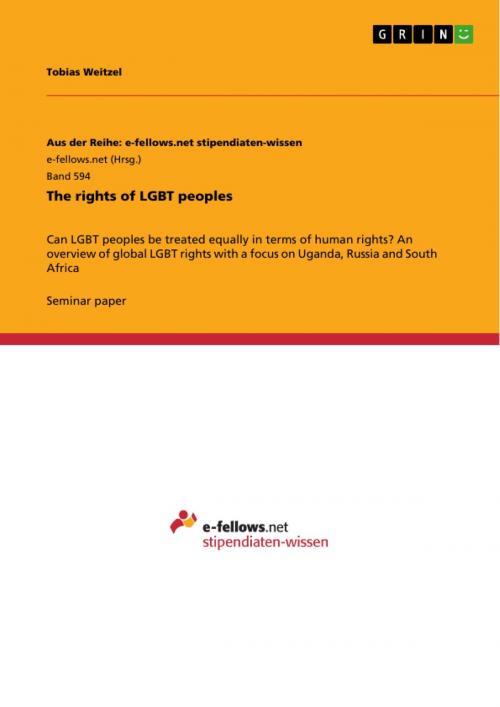The rights of LGBT peoples
Can LGBT peoples be treated equally in terms of human rights? An overview of global LGBT rights with a focus on Uganda, Russia and South Africa
| Author: | Tobias Weitzel | ISBN: | 9783656332626 |
| Publisher: | GRIN Verlag | Publication: | December 11, 2012 |
| Imprint: | GRIN Verlag | Language: | English |
| Author: | Tobias Weitzel |
| ISBN: | 9783656332626 |
| Publisher: | GRIN Verlag |
| Publication: | December 11, 2012 |
| Imprint: | GRIN Verlag |
| Language: | English |
Seminar paper from the year 2012 in the subject Politics - International Politics - Topic: Public International Law and Human Rights, grade: 1,7, James Cook University (Law), course: International Human Rights Law, language: English, abstract: 'Homosexuality is assuredly no advantage, but it is nothing to be ashamed of, no vice, no degradation, it cannot be classified as an illness; we consider it to be a variation of the sexual function produced by a certain arrest of sexual development.' This statement is from one of the world's most famous neurologist, Sigmund Freud, which developed psychoanalysis in 1935. Despite this statement it took 55 more years until the World Health Organisation (WHO) removed homosexuality from the list of mental disorders. Until 1993, homosexuality was classified as a harm of the body or mind, with the LGBT rights campaign still a young 'discipline', although achieving big successes in recent years. Nevertheless there is still a huge inequality between heterosexuals and LGBT peoples. Human rights in totality are more of a political issue than a legal issue. Only the collective understanding of human rights makes them universal, with citizens expecting their state to comply with them. This includes the rights of the LGBT peoples. Based on science a percentage, between 5 and 10 percent, of the human population identify as gay, this issue concerns between 350 to 700 million people. Not included are the estimated percentages of bisexual and transgender people, who also relate to these rights. Regardless of this it is surprisingly that the prosecution, discrimination and ostracism is not hidden, but rather operated in an open and partially aggressive way by religious communities, government bodies and individuals. This essay is going to answer firstly whether the LGBT rights could be classified as human rights. Secondly, there will be a discussion of the United Nation (UN) Declaration specifically the LGBT peoples. Thirdly, there is an overview of the global LGBT rights with particular focus on three selected countries: Uganda, Russia and South Africa, as these countries currently attract attention primary due to LGBT rights. Accordingly there is a critique and a conclusion.
Seminar paper from the year 2012 in the subject Politics - International Politics - Topic: Public International Law and Human Rights, grade: 1,7, James Cook University (Law), course: International Human Rights Law, language: English, abstract: 'Homosexuality is assuredly no advantage, but it is nothing to be ashamed of, no vice, no degradation, it cannot be classified as an illness; we consider it to be a variation of the sexual function produced by a certain arrest of sexual development.' This statement is from one of the world's most famous neurologist, Sigmund Freud, which developed psychoanalysis in 1935. Despite this statement it took 55 more years until the World Health Organisation (WHO) removed homosexuality from the list of mental disorders. Until 1993, homosexuality was classified as a harm of the body or mind, with the LGBT rights campaign still a young 'discipline', although achieving big successes in recent years. Nevertheless there is still a huge inequality between heterosexuals and LGBT peoples. Human rights in totality are more of a political issue than a legal issue. Only the collective understanding of human rights makes them universal, with citizens expecting their state to comply with them. This includes the rights of the LGBT peoples. Based on science a percentage, between 5 and 10 percent, of the human population identify as gay, this issue concerns between 350 to 700 million people. Not included are the estimated percentages of bisexual and transgender people, who also relate to these rights. Regardless of this it is surprisingly that the prosecution, discrimination and ostracism is not hidden, but rather operated in an open and partially aggressive way by religious communities, government bodies and individuals. This essay is going to answer firstly whether the LGBT rights could be classified as human rights. Secondly, there will be a discussion of the United Nation (UN) Declaration specifically the LGBT peoples. Thirdly, there is an overview of the global LGBT rights with particular focus on three selected countries: Uganda, Russia and South Africa, as these countries currently attract attention primary due to LGBT rights. Accordingly there is a critique and a conclusion.















